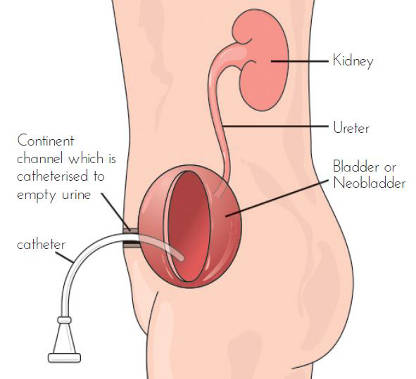
Rachel Wall BA (Hons) CIMDip
Marketing Manager, Mitrofanoff Support
Tips from the Mitrofanoff Support charity for keeping your bladder healthy after having the Mitrofanoff bladder diversion surgery.
What is a Mitrofanoff?
In 1976 Professor Paul Mitrofanoff created a procedure, now known as the Mitrofanoff, for people who were unable to empty their bladder in the usual way.
- The procedure creates a channel between the bladder and the skin of the abdominal wall either on the side of the stomach or in the tummy button.
- A small tube (catheter) is passed through the channel to empty the bladder
- The channel avoids the need for a permanent bag

Who may need a Mitrofanoff?
Surgery may be required due to bladder, bowel or prostate cancer, or congenital birth malformations such as bladder exstrophy, posterior urethral valves and spina bifida. Those with multiple sclerosis or spinal cord injuries may also need the procedure and patients as young as three have been offered this surgical solution.
How Mitrofanoff patients can keep their bladders healthy
After surgery it is important for patients to look after their bladder to reduce the risk of urine infections, kidney and bladder stones.
Bladder washouts: Patients who have a neobladder or who have had their bladder enlarged using part of the bowel will need to perform weekly washouts to remove debris such as mucus, which is naturally produced by the intestine.
Management of mucus: Certain foods and drinks including dairy products, caffeine drinks, ale etc. can increase the production of mucus. Similarly, ailments such as colds, hay fever or gastrointestinal upset can also have an impact on mucus levels.
Drinking plenty of fluids: It is important patients drink enough to flush out the chemicals and debris that build up in the blood, kidneys and bladder and to help prevent urine infections. Two to three litres a day is ideal to keep urine a healthy light colour.
Regular toilet breaks: Mitrofanoff patients are sometimes unable to feel when they need to empty their bladder and so it is important that emptying takes place every three to four hours to reduce the risk of infection.
Healthy eating: This type of surgery can have an impact on the bowel function, either short or long term. If patients find there is a change in their bowel movement once they have fully recovered from surgery, they should discuss this change with a healthcare professional. Eating a varied and balanced diet will help the immune system to fight off any bugs and enhance recovery. Junk food should be avoided as it is high in fat, sugar, salt and calories.
Where can Mitrofanoff patients gain support and advice?
The Mitrofanoff Support charity, founded in 2012, provides patients and their respective families with free support, information and advice. More details can be found on their website mitrofanoffsupport.org.uk and via social media.


